The project recently had its third, and final (for this stage at least), workshop. The focus of this workshop was to begin building on the ideas that have been sketched and developed so far for a shared, national approach to scholarly monographs.
I recently wrote about the refinement of the ideas that emerged from our second workshop.
We turned the 21 original ideas into 8 idea themes which we then took to the third workshop for people to build on and begin to think about key features, risks and next steps.
The Ideas
Below are the 8 high level ideas, and some of the key features which the workshop developed (click on the idea image to read more of the detail).
These are our first attempt at defining these ideas, so expect further refinement and improvement!
At the very end of the post is a flip book with all the raw outputs from the workshop, which contain even more information and richness than this quick overview can provide.
A shared monograph publishing infrastructure enabling innovative approaches to monograph publishing.
Top 3 Features:
- Flexible dissemination: OA as standard, includes added value services, flexible pricing, multiple access modes.
- Academic recognition/impact: Focus on quality process and product and responsive to shifts in academic drivers (promotion) with enhanced metrics.
- Sustainable: Foundation is built on exploring new business models and testing what is possible.
Next steps: Establish pilots (i.e., UCL Gold project; Huddersfield HOAP) to test academic buy-in, costs of new model, impact on readers/users. Also partnerships with existing publishers. Collect evidence from pilots and evaluate.
A comprehensive and open bibliographic and holdings database enabling the development of new applications and services for libraries, systems vendors, publishers and users. A shared service with shared infrastructure.
Top 3 Features:
- Membership: Go beyond libraries (museums etc).
- Shared collection management: Enables agreed responsibilities across sector and builds on existing tools.
- Enrichment: Enables the enrichment of shared metadata and innovative approaches to cataloguing.
Next steps: Use Hathi Trust to ensure any proprietary data is replaced with open surrogates; Liaise with KB+, Copac etc; Explore business models; Undertake cost/benefit analysis based on stakeholder group.
Services and applications built using the monograph knowledgebase infrastructure/data.
Example Apps/Services:
- Preservation app: Identifies rare and unique materials locally and guides preservation decisions. Features include: Alert system (Priority material for preserving/digitisation); Risk calculation (traffic light system on at risk items).
- Cataloguing app: Enables the collaborative enrichment of metadata and local download. Encourages crowdsourcing and innovative cataloguing models.
Next steps: Establish appetite with libraries, vendors, publishers and users. Dependency on knowledgebase development.
A high-level, ‘think tank’ providing a systematic view across the disparate parts of the scholarly comms/monograph landscape.
Top 3 Features:
- Credible: The right stakeholders with authority (includes some ‘disruptors’).
- Holistic: Overview and communication between otherwise disparate areas.
- Managed (Curated): Facilitated, iterative, funded by members, time-limited membership.
Next steps: Environmental scan; Sketch out governance etc in more detail; Speak to possible members
Establishing the criteria and potential for new monograph publishing business models.
Top 3 Features:
- Maximise Impact/reach: Focus on social responsibility and making public funded research available to public.
- Sustainable: Develop business models for open access.
- Value for money: Delivers value to the stakeholders involved.
Next steps: Assess outcomes of current work in this area (e.g., Knowledge Unlatched); explore the actual demand for monographs (maybe the model doesn’t work for a reason – maybe we just need print on demand).
Building on the monograph knowledgebase this application enables researchers, libraries and publishers to track and manage the impact of their monograph to provide new insights, track influence and inform purchasing.
Top 3 Features:
- Neutral: ‘The Switzerland of publishing’! Non-commercial, collaborative, no defining metric.
- Open: Available to all, includes variety of data and allows re-use of data.
- Learning: Is open about its limitations and seeks to improve its understanding of users.
Next steps: Review feasibility (explore current data sets, find gaps etc); Test user appetite; undertake small scale pilot.
A national strategy that: Creates an infrastructure/services; Sources and secures funding; Has a national collection management approach; Undertakes analysis and prioritises collections.
Top 3 Features:
- Consult publishers: Work with Jisc collections and consult with a variety of publishers on business models etc.
- Public/Private: Explore models for public/private partnerships.
- Strategy: Focuses on de-duplication of local effort.
Next steps: Establish scope of current digitisation corpus; begin discussions with funders; work with spotlight on digital (gap analysis) and other work in this area; test partnerships with vendors.
A nationally negotiated agreement for digital monographs.
[This idea was not developed further in the workshop]
Next steps: Possibility of holding a workshop to address this area, with Jisc Collections and other relevant stakeholders.
The workshop outputs
The above is my attempt to try and reduce some of the rich ideas and thinking that emerged from our final workshop. So, if you’d like to read more of the detail that surrounds these ideas then take a look at the flip book below.


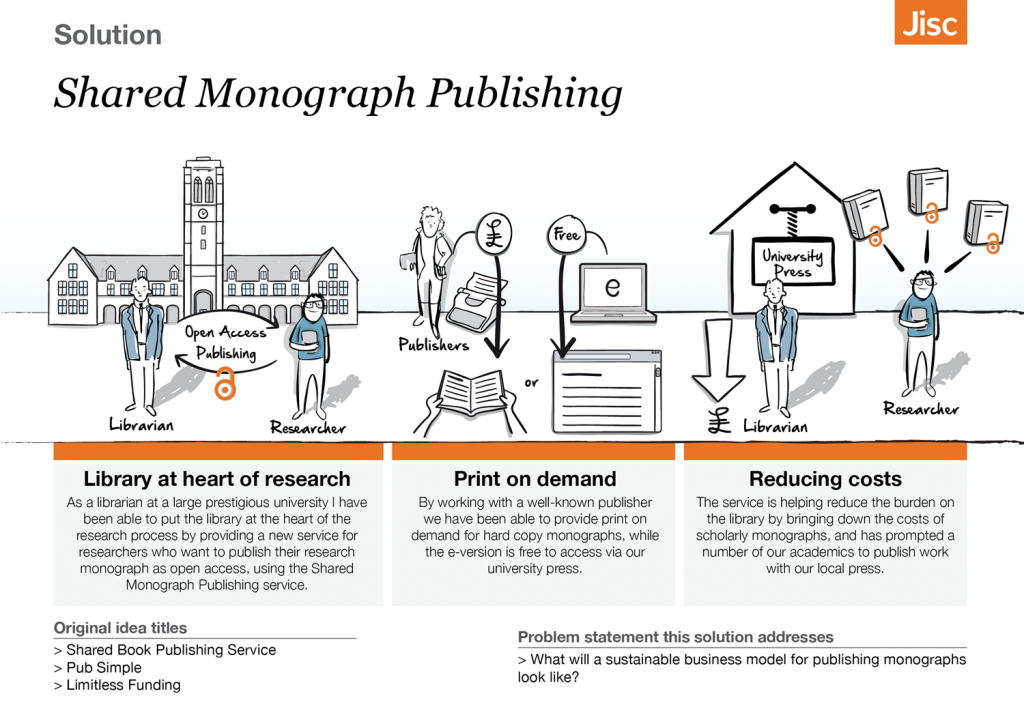
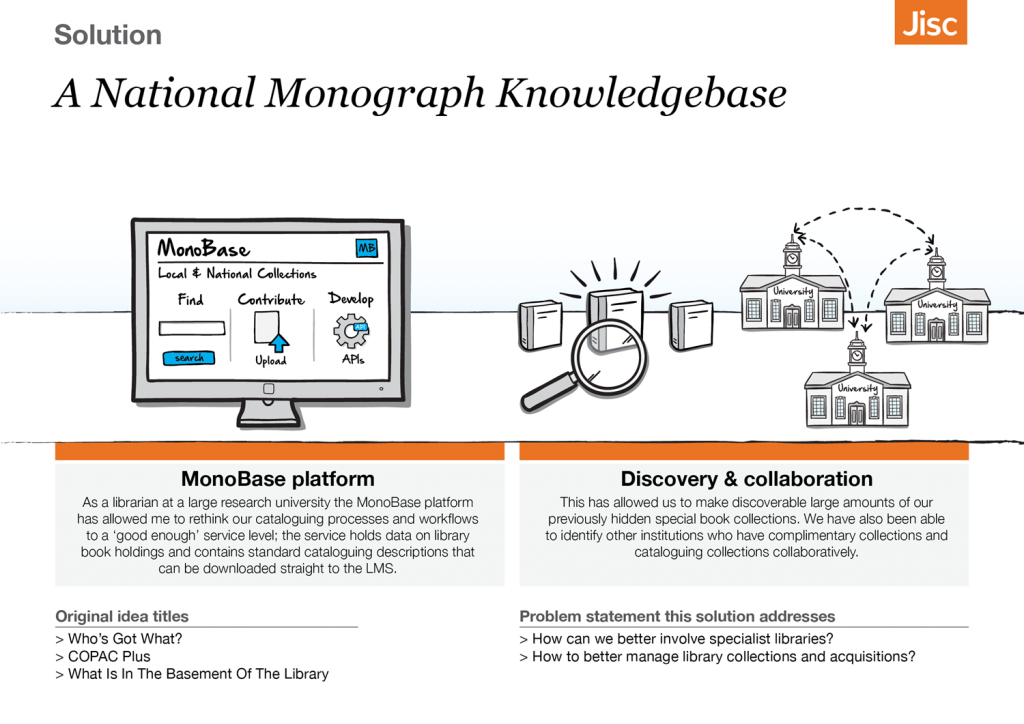
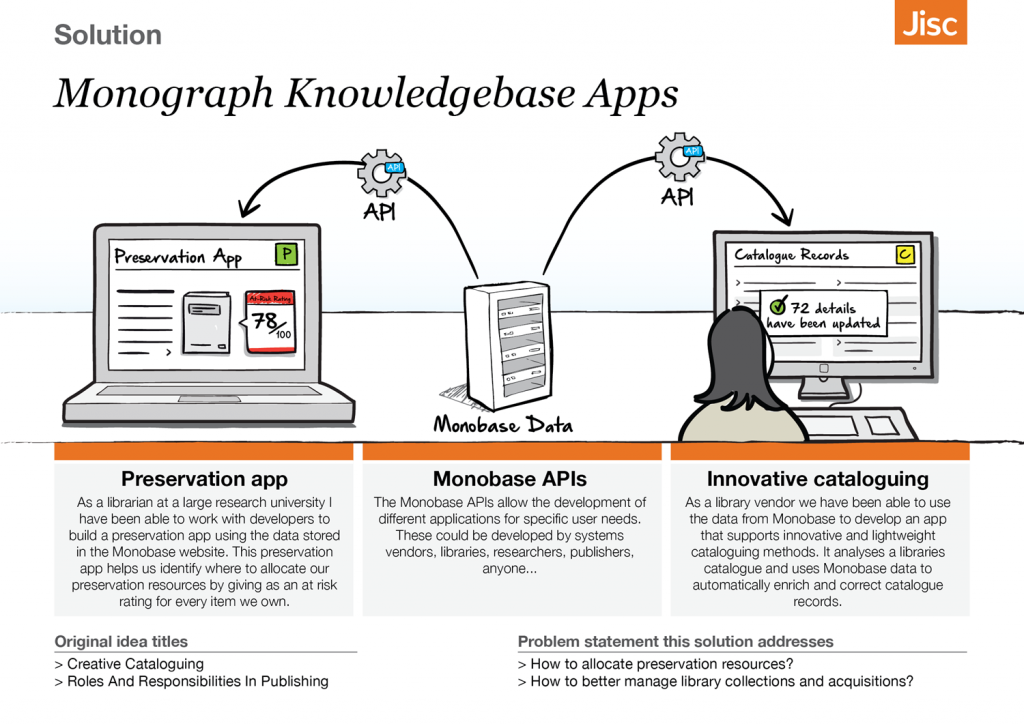
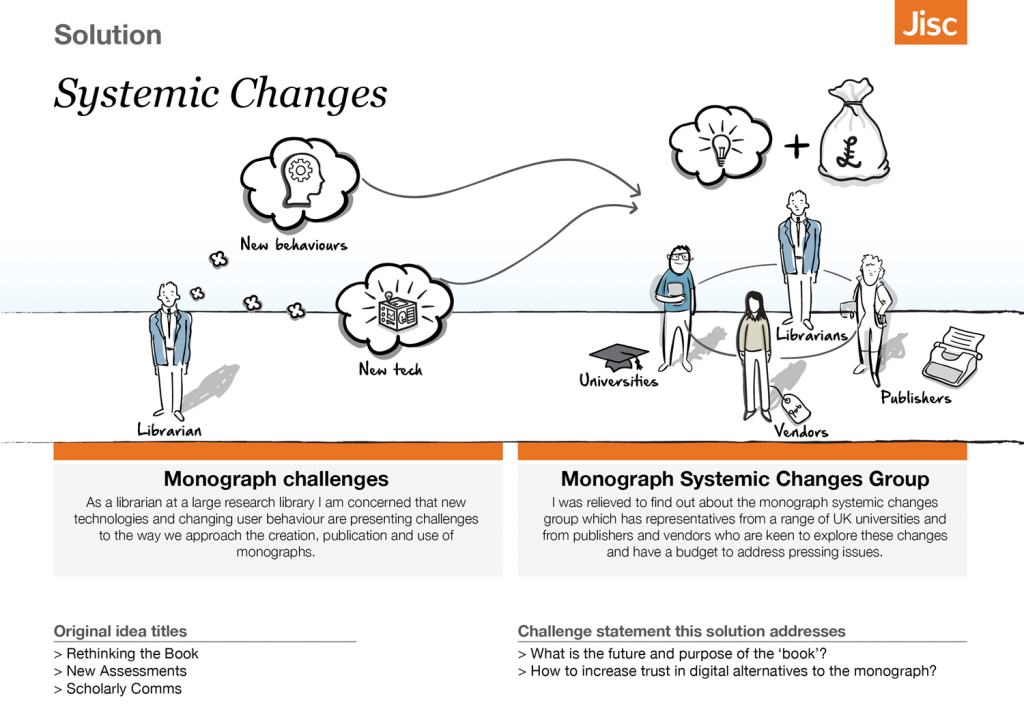
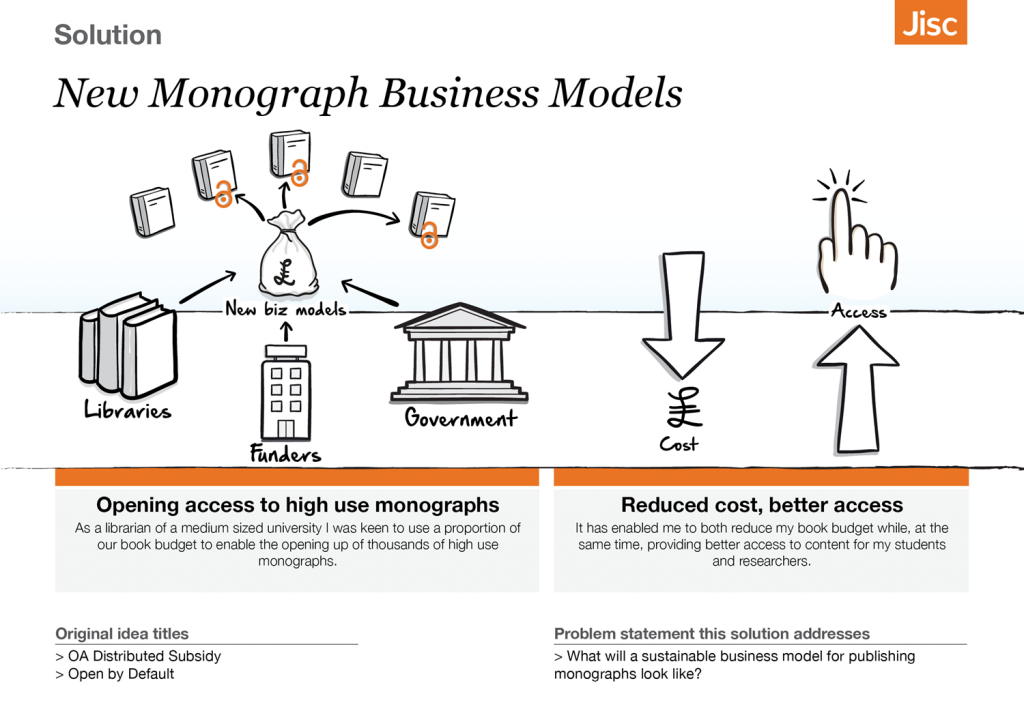
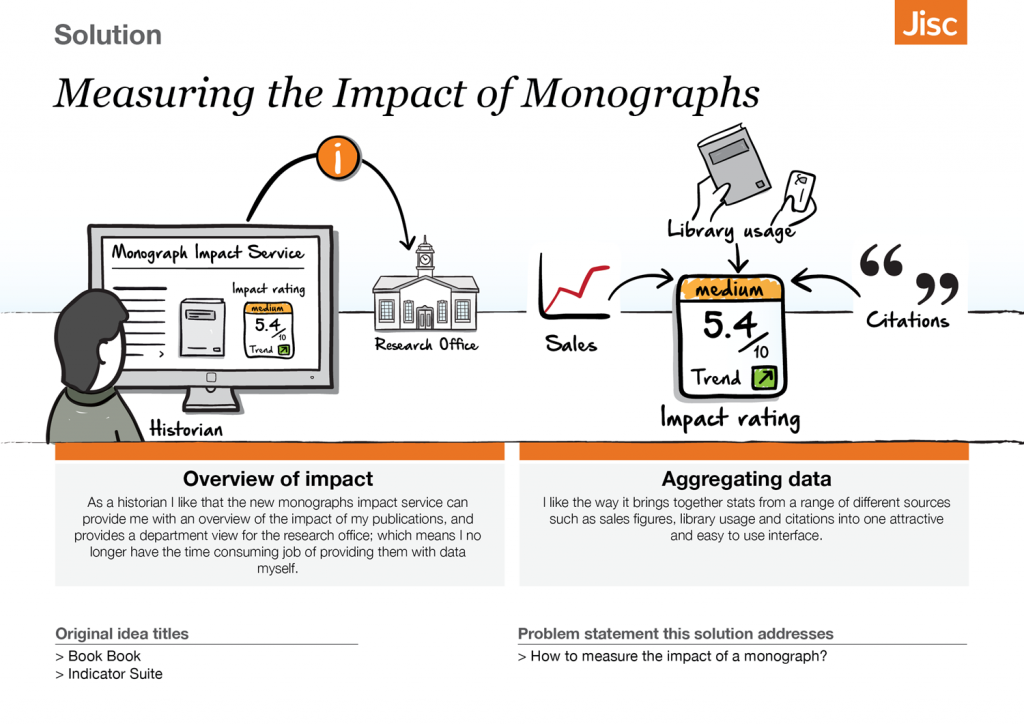
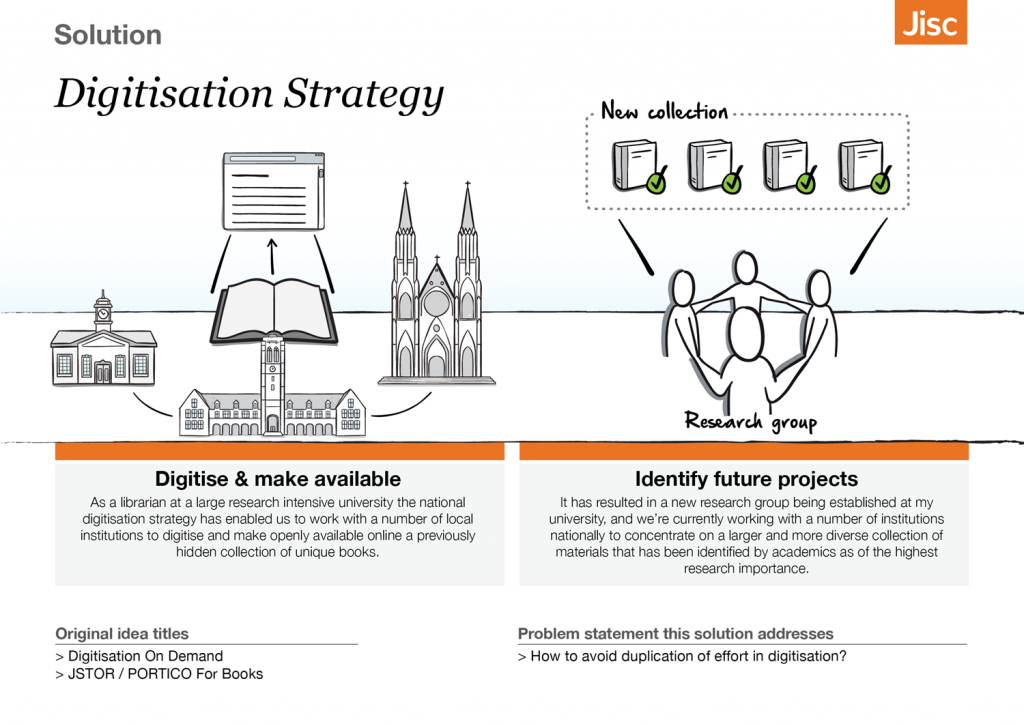
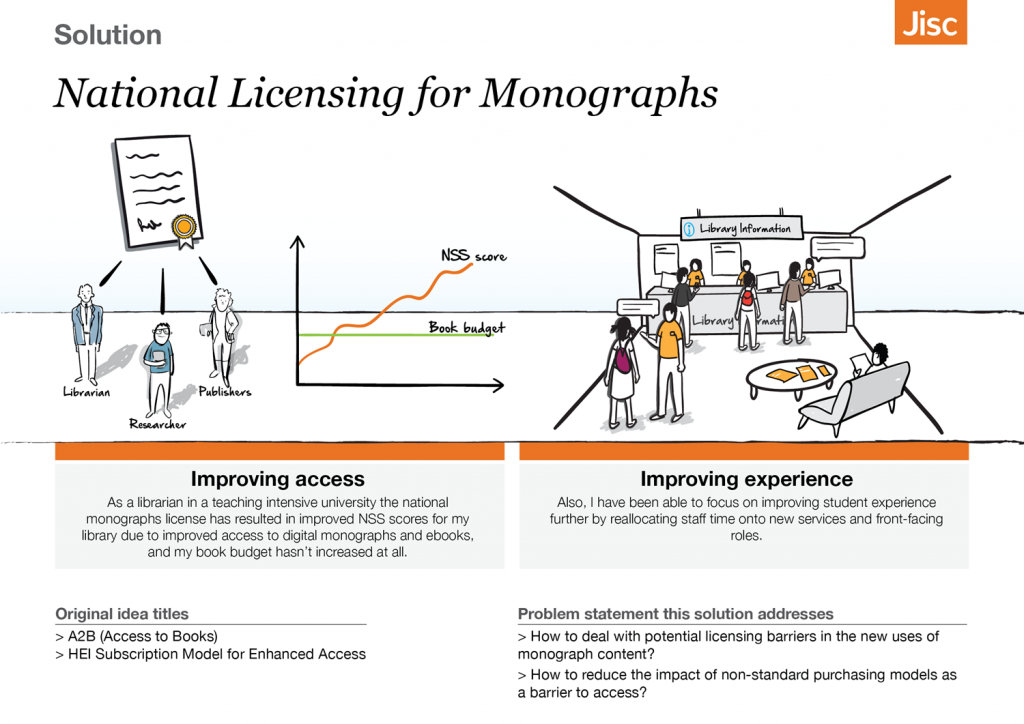
Pingback: A Monographs 'Solution Stack'! | National Monograph StrategyNational Monograph Strategy